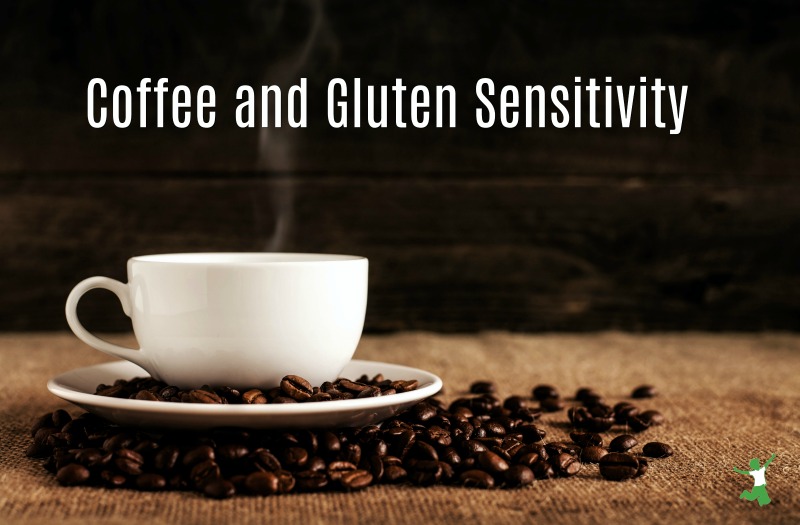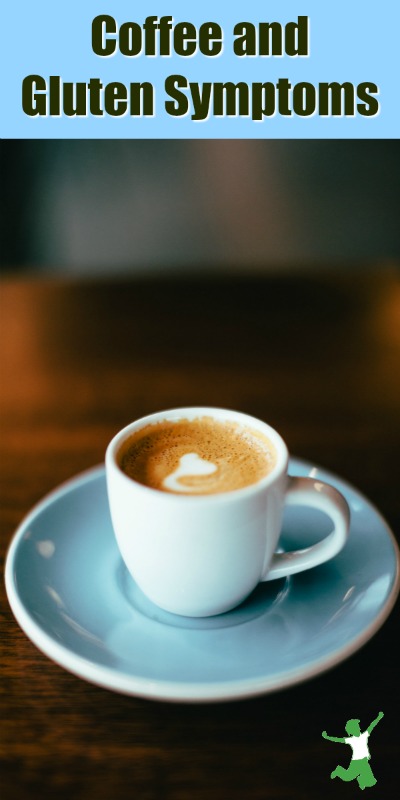Table of Contents[Hide][Show]
Coffee should be avoided by those who are Celiac and many who suffer from wheat sensitivity as it contains cross-reactive proteins to gluten.

If you drink coffee, even bulletproof coffee and have gluten sensitivity or celiac, you might want to sit down for this one.
There is a surprising connection between gluten and coffee that is by and large ignored by the health community. This revelation holds ramifications for other autoimmune disorders as well.
The problem has nothing to do with caffeine, so decaf coffee would be included in this discussion.
In a nutshell, fairly recent lab research has revealed that 10% of coffee is a protein that cross-reacts with gluten antibodies.
This means that if you are gluten sensitive or celiac and are avoiding gluten-containing grains or perhaps have even gone completely grain-free if you still drink coffee there is a strong likelihood that the protein in the coffee is triggering the very same gluten-related health problems you are trying to avoid.
In other words, even if you think you are doing fine with your current gluten-free diet, it is very possible that skipping the coffee could take your health to the next level.
Symptoms of Gluten Sensitivity
Most people who are gluten sensitive don’t realize it because gastrointestinal problems like burping, gas, tummy upset, or toilet issues are the least common way for gluten issues to present themselves!
The most common symptoms of gluten sensitivity?
Migraines and other neurological issues – even MS!
Hormone and endocrine problems are another common way for gluten issues to manifest themselves.
How Coffee Triggers Gluten Sensitivity
So what exactly happens when a gluten sensitive person eats gluten?
Folks with gluten antibodies react to any gluten in the diet by mounting an immune response. This means that gluten is perceived by the body as an invader and the gluten antibodies attack the gluten itself trying to destroy it. This gluten attack is an inflammatory response and inflammation issues can occur anywhere in the body in any tissue or organ.
Here’s the real shocker I came across when researching the coffee/gluten connection:
According to Dr. David Clark DC, functional neurologist and endocrinologist:
There’s not a disease or health condition you can think of that does not have an association – in the research literature – with gluten sensitivity.
That’s a very strong statement!
In essence then, if you are gluten sensitive in any way shape or form, and it seems that most people are whether they know it or not given the epidemic levels of autoimmune issues today, gluten antibodies have the potential to react to proteins in other foods as if they are gluten thereby triggering an immune and inflammatory response.
The protein in coffee is the most common cross-reactor for gluten. Because it is the protein in the coffee that is the trigger, switching to decaf coffee does not solve the problem. Apparently, instant coffee is the worst offender.
Is it possible to be gluten sensitive and not cross-react to coffee? Yes, it’s possible but you’ll have to do some expensive lab testing with a knowledgeable doctor to find out.

Reference
Journal of Food and Nutrition Sciences
More Information
You Probably Need to Change WHEN You Drink Coffee
Coffee Enema
Morning Coffee Fix
Caffeine and Chronic Back Pain
Healthy Coffee Substitutes








Im celiac..and react to coffee..stopped coffee about 2 years ago
Because of the reaction, now more reports are coming out with
Coffee being a cross allergen..my reaction was severe dizziness, light headed, confusion..
Also react to wine, the fining agent used in some wines, contain gluten
😉
Way to go Sarah. I appreciate that you share new knowledge. I am just discovering keys to my own health thanks in a very large part to your blog.
Read alllll the comments! Wow! This is something to consider, certainly, but I wonder if certain acid/alkaline conditions in peoples’ bodies are what cause them to be sensitive to coffee, and if so perhaps those with gluten sensitivity have an imbalanced acid/alkaline condition already, so that drinking coffee exacerbates the acidity imbalance and/or protein sensitivity. If that makes any sense. I also wonder if one drinks a brand of coffee stated to be “low acid” as I’ve seen occasionally, if they might still experience problems with coffee. I suspect coffee is one of those things that is popular but not widely beneficial to begin with.
I wonder that it has much to do with gluten at all, since the celiacs on here I think have all said they don’t have a reaction to coffee.
This couldn’t have come at a more perfect time 🙂 I have been grain free since September of last year. If i get any grains I start retaining fluids. Recently I’d gained about 7 lbs and I couldn’t figure what it was from.. But I felt bloated and couldn’t wear my ring because of it. (I’ve been 40 lbs heavier and could wear it). I’d been drinking much more coffee recently, and now 3 days off the weight is off. Would never have guessed!!!! Thanks!!!
According to several doctors to whom I sent this information: if, in fact some people have a reaction to coffee (and not the sugar, sweeteneres, creamers or cream), it is a very rare reaction and might going away once the villi heal and the small intestine is healthy. As someone else said, coffee is a bean, not a grain. Flavored coffees may be suspect as well as instant flavored coffees which may contain barley or barley extracts. What some people may be having is a lactose-intolerance reaction to the creamor creamers, or the extracts used to flavor the beans during the roasting process. For a lab of any kind to post this information without proper medical backup and scientific testing backup, is reckless at the least and dangerous as well. Coffee actually is good for us as it contains anti-cancer benefits as well as other qualities which afford migraine relief for some people. Unless you are consuming a dozen cups a day, there is no reason to believe a cup or two a day is going to hurt anyone. The old saw applies… “don’t believe everything you see or read: or take it at face value”. If giving up coffee works for you, fine, and it relieves digestive issues, go for it. It simply doesn’t mean everyone has to. The good in coffee far outweighs the bad. Far better to give up grains which the human body was never intended to digest anyway and what with the insectices and fungicides being sprayed on crops, the grains growing in this country are kiling us. Enough said.
coffee is now GMO, it is also the most pesticide/herbicide sprayed crop..period.if one uses coffee, it must be non gmo and organic.
There are .3 grams of protein per cup of coffee. That immediately throws your comments into doubt Stephanie. http://nutritiondata.self.com/facts/beverages/3898/2
I sent a link to the Canadian Celiac Association, because this was all news to me. I only have one cup of coffee a day, but I’d give it up, along with many other pleasures the average celiac has given up, if it meant I had one less source of ill health.
The response was clear, “The protien content of brewed coffee is zero… so that immediately throws the accusation into doubt.”
“At this point, I have not found scientif evidence that meets the CCA standar (publising in a peer-reviewed journal) on this topic. To be hones, I have not found any mainstream medical evidence on this topic at all.”
This is good news, and as far as I’m concerned, I’ll continue to have my single cup a day. It is not reasonalbe that the coffee industry is so all powerful as to suppress scientific study — not anymore than the wheat industry, which has already lost the business of all celiecs.
Cyrex labs has a cross-reactivity test you can do for the 25 most common cross-reactors including coffee. I found out that Quinoa, millet, lactose and wheat are all cross-reactive for me. Coffee was all good, even though I rarely drink it anymore.
coffee does not cause gluten reactions this is an old wives tale that has been going around and around
coffee is a bean and is no way related to the gluten found in wheat rye or barley
those of you who have had problems: check your diet, check for cross contaminated products, toasters, wooden spoons, jelly, mayo for double dipping,
check your OTC drugs and RX drugs
Now that said you can be allergic to caffeine in the coffee even defac has some in it. so that is most likely the problem but if coffee were the problem then yearly tests would be bad for most of us—-I drink a ton of coffee a day but every year my tests are negative for CD if coffee had gluten in it then the tests would not be negetive
I don’t think she said that coffee has gluten in it. I believe she said it was another protein and that not everyone negatively reacts to it.
This is fascinating, I have been gluten sensitive for a long time, after 2 years gluten free my symptoms (which made me originally think i was sensitive) got worse and worse and I have been diagnosed with secondary progressive MS.
I have a relatively good diet, gluten free, lots of greens and supplements.. but I still have problems. I have long tried to ignore how bad I feel after my morning coffee because it’s what keeps me going for a few hours before I have a tea.
I believe there is a very strong like between gluten and MS, most people with one autoimmune disease will get another.. this is my 3rd since I was 18.
I am now giving up coffee.